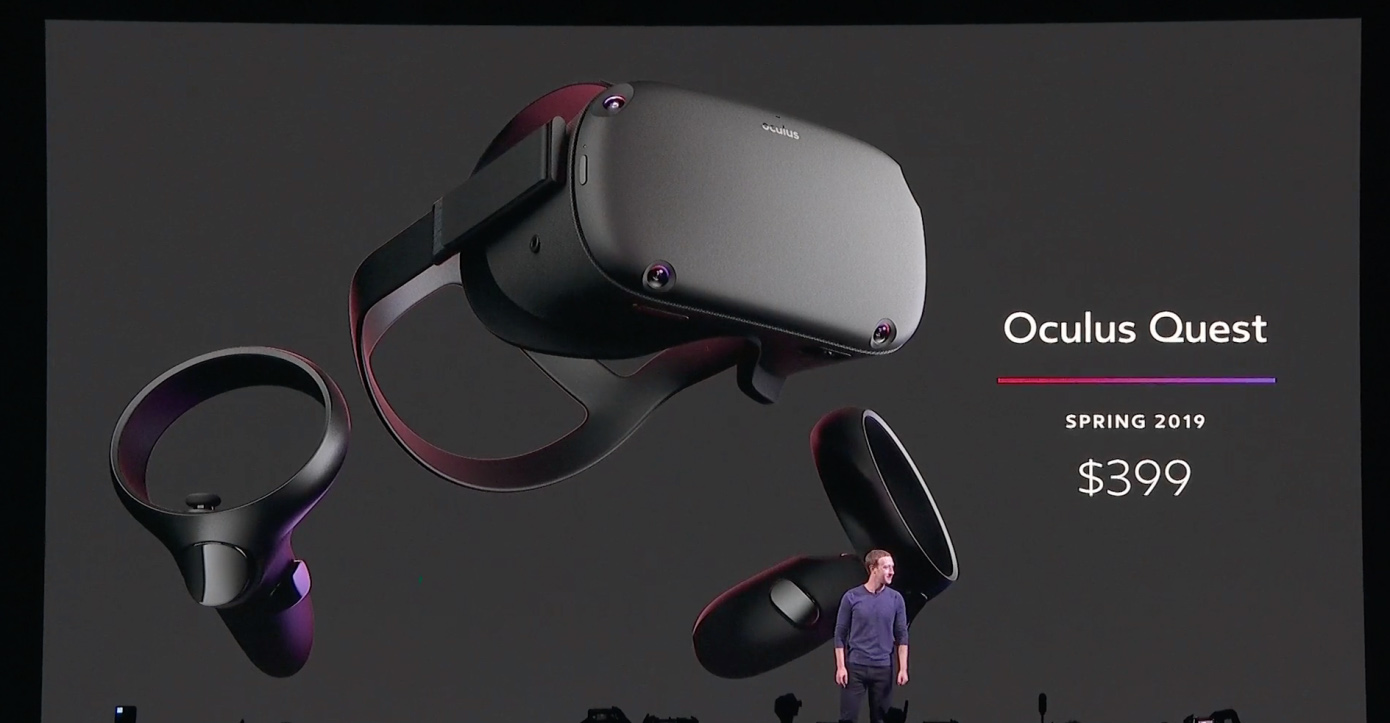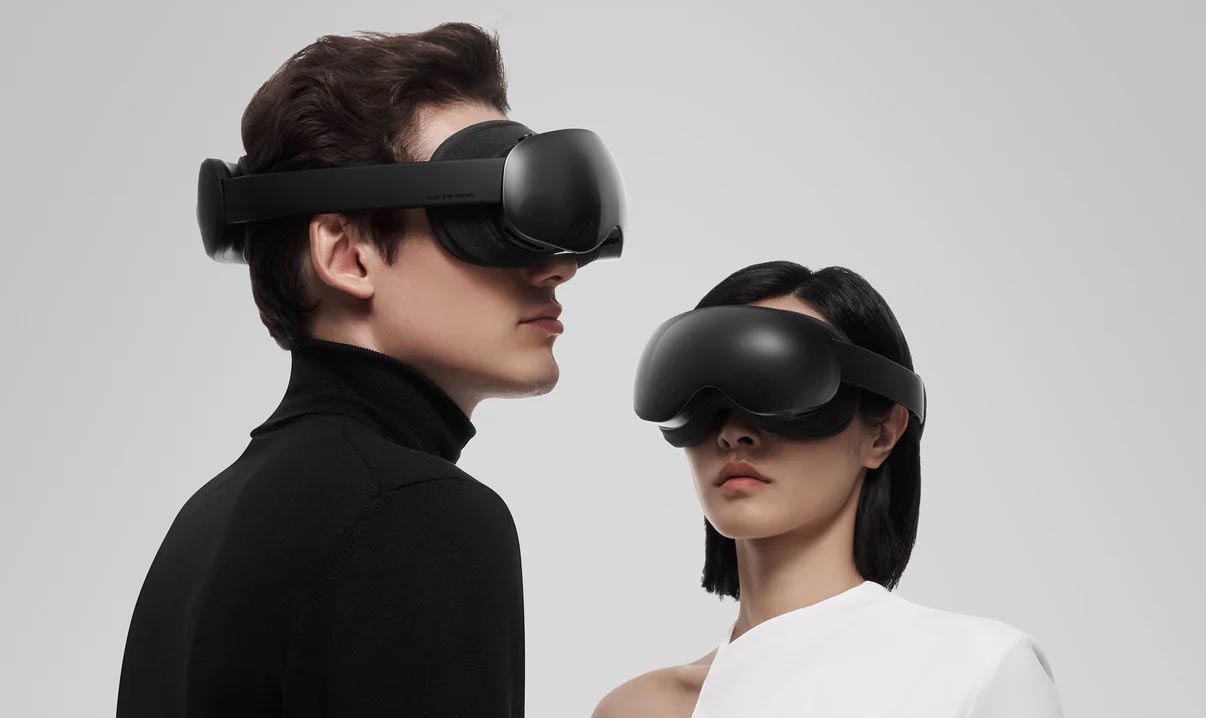The Ghost Howls’s VR Week Peek (2019.10.27): Quest sales are not taking off, Minecraft Earth launches in Early Access and much more!
I’m back in Italy, and finally, I can eat again some good pasta… even if I will miss 包子 for breakfast a lot!
If you were wondering, my journey to China has gone pretty well and many people liked HitMotion at WCVRI. Stay tuned on my blog for more articles about my Chinese experience in the upcoming days!
But now, it is the turn of some cool AR and VR news…
Top news of the week

Oculus Quest may have sold only 400,000 units
The latest report on virtual reality by SuperData doesn’t offer us great news on the VR landscape. It seems that according to it, Oculus Quest, considered by many the first VR headset that can become mainstream, has sold only 180,000 units in Q3 of this year, for a total number of 400,000 units sold since launch. These numbers seem confirmed by a parallel analysis by AR Insider.
The numbers are good if we compare the Quest to other VR headsets (probably the Rift has sold 1M units since 2016… so 400,000 units in few months is a good number), but are bad in the grand scheme of things: the Nintendo Switch, which Oculus compares the Quest to, has sold over 36M consoles since launch. If Zuck says that “we’re selling Quest as fast as we manufacture them”, ironically we can comment that they are not that fast in manufacturing :D.
Personally, I am not that surprised and I think no one of you should worry, for mostly three reasons:
- In the holiday season, the Quest will sell lots of units for sure;
- Superdata has always made wrong forecasts. Every person informed in the field has always said that their numbers are wrong, and usually, they are on the lower side. Palmer Luckey himself has in fact commented this news saying that these numbers are wrong. So, we can expect that the number of sold Quest is actually higher. Not THAT higher, though: I think they are more, but in the same order of magnitude (e.g. 600,000);
- We have always predicted that Quest would have sold 1–2M units in 2019. Whoever was predicting mainstream adoption, was just driven by hype. Mainstream adoption requires time, content and money. If we just scream “Mainstream adoption” to every new headset (it has happened also with Go), then we just become disappointed that it has not happened, and the “VR is a failure” articles pop up like mushrooms. The Quest is selling well, and Oculus itself didn’t expect billions of sales. VR times will come, but give VR the time it needs.
More info (Statistics by Superdata)
More info (Statistics by AR Insider)
More info (Statistics on all headsets by AR Insider)
More info (Palmer Luckey disagreeing on the data)
Other relevant news

Minecraft Earth is now releasing in early access
The time has come and finally Minecraft Earth, one of the most awaited AR games of the year, is being released in Early Access.
The game, previously in closed beta, is now starting rolling out worldwide. Microsoft wants to play safe, though, so it is now launching it only in two small countries, so that to identify possible problems only in a small subset of the worldwide population before the big launch. The two lucky countries are New Zealand and Iceland. As soon as MS will verify that the game is performing well in these two little test markets, it will expand it in always more countries, until it will reach worldwide distribution, that should happen before the end of the year.
I can’t wait to see how this game will perform. I think that this game has the potential of creating such a hype that will be inferior only to the one created by Pokemon Go at launch.
More info (Minecraft Earth release)
More info (Minecraft Earth gameplay video)
Samsung will manufacture the chips for Facebook AR glasses
According to the Korean outlet “The Electronic Times”, Samsung will manufacture the tracking chips that will be used by Facebook AR glasses. The report claims that the chip will use the latest 7nm process, the same used to produce the SoC for the Galaxy Note 10.
These chips should be the one implementing the 6 DOF tracking of the headset. Currently, the 6 DOF tracking of headsets like the Quest is performed via software (with the help of special DSP chips by Qualcomm), and while this has the advantage of making the tracking easily upgradable via software updates, it has the disadvantage that it consumes more electrical power and also computational resources dedicated to the VR applications. Having a dedicated chip would make the tracking faster, more power-efficient and would also give more computational power to the applications running on the glasses.
It is not a chance that this is the approach that also Microsoft has taken for its HoloLens, where the HPU performs all the heavy-lifting for the positional tracking. It is so highly probable that also Facebook will follow the same route.
A new patent highlights the possible design of future Samsung AR glasses
In a patent filed by Samsung and spotted by Galaxy Club, it is possible to see the design of what appears to be an augmented reality glass. The headset appears lightweight, with a cable coming out from its frames, and this makes us think that it could be connected to an external unit, that most probably could be one of the latest Samsung phones.
Big companies patent lots of stuff, so this design could actually never come to light, but I think that it is pretty intriguing and it is also something that could come to the market…
Bloomberg publishes new hints on Apple glasses
Every week we have new hints on Apple glasses: it is no more a matter of “if” they will come to the market, but a matter of “when” and “what”.
In today’s speculation, Bloomberg talks about a device that can connect to the next iPhone, that for the occasion will have a big overhaul over previous devices: it will feature 5G and a 3D rear camera, powered by a depth sensor. According to the report, Apple iGlasses will make the user see in front of his eyes interesting things present in the phone, like notifications, e-mails, text messages and games. They will also have a dedicated store of AR apps, like it already happens for other Apple gadgets, like the Apple Watch and Apple TV.
Microsoft details 3 interesting R&D projects
This week, Microsoft has released the papers of three interesting research projects. If you’re nerd enough like me, you will find them interesting.
- The first one is called DreamWalker, and it is a system for world-scale VR. Equipped with a backpack, a VR headset and other sensors, the user can walk in the streets safely following a path from point A to point B while following a similar path in the VR world he is in. The headset and the other sensors detect the obstacles surrounding the user, and put virtual obstacles (like traffic cones or people) in the virtual world, so the user can safely follow the path without stumbling over a wall in real life;
- Capstan Crunch is a prototype of a haptic system that employs springs to provide force feedback to the user while he grabs virtual objects with the thumb and the index. The provided force is variable, so it can simulate both rigid and elastic objects;
- The last one is a research on how to use eye tracking in VR. Most of the provided use cases are pretty original: in one of them, the system provides the classical FOV reduction when the user moves in VR, but instead of showing a black frame in the peripheral vision, the system displays a blurred 1 Hz version of the world, that makes the visuals more immersive. Or the system can understand via gaze analysis what are the tastes of the users and modify the world accordingly to its tastes, changing its details when the user is not looking at them.
I love these research articles, and I hope you will love them as well.
More info (Dreamwalker world-scale VR)
More info (Capstan Crunch)
More info (MS eye tracking research)
News worth a mention

NVIDIA starts offering XR cloud rendering
NVIDIA is looking for enterprise partners to start experimenting with its early access CloudXR SDK. With this SDK, that has been released this week, it will be possible to run OpenVR (i.e. SteamVR) apps on cloud servers and then stream them to Android and Windows devices via 5G. This is what we are all waiting for: 5G cloud streaming that can make XR glasses become super lightweight!
But wait a bit before celebrating: 5G is not widespread yet, and the CloudXR SDK is still pretty rough: a professional that I know defined it “pretty buggy”. So, it will take time before the future happens, but it’s cool that NVIDIA is already working on it…
More info (News on Road To VR)
More info (Official blog post by NVIDIA)
HTC keeps updating the Vive Cosmos
It seems that HTC has taken the critics on the Vive Cosmos very seriously and it is now updating the runtime of the device every week. This week we had another update that improved tracking and reliability of the headset in low-light conditions. I hope that in some weeks all the problems will be fixed…
Oculus starts its Halloween sale
Halloween is now close and Oculus has started its classical sale dedicated to horror games. The sale is full of interesting discounts, even if strangely, some of the most famous scary games are not listed…
John Carmack talks VR videos
John Carmack, the god of programming, has written on Oculus blog an interesting post about his experiments on VR videos streaming and playback. The article is full of amazing information, and if you’re in the field, you will love it for sure. Otherwise, if you, like me, are not in the video sector, you understand maybe 25% of what he has written… 😐
Grove wants to take support groups to VR
Grove is an interesting project on Kickstarter that aims at taking support groups to virtual reality. The idea is to create a platform, very similar to a social VR environment, where people can meet and talk about their problems in rooms dedicated to a single topic (e.g. one for people suffering from alcoholism, one other for people suffering the loss of a person, etc…).
I like this project because support groups in VR may be very useful to connect people from all over the world having similar problems. And VR could guarantee to these people even more anonymity than standard anonymous groups.
We have new developments on the Magic Leap vs nReal lawsuit
Do you remember Magic Leap suing nReal because its founder, a previous Magic Leap employee, may have founded the Chinese startups using Magic Leap IP? Well, things are going forward, but Magic Leap has had big problems in finding Chi Xu, the founder of nReal, to make the lawsuit go on. Finally, nReal has set a legal representative in the US and the parts have now agreed to meet in January 2020. Let’s see if they will settle or if the case will end in a court…
In the meantime, nReal is continuing its business and has partnered with one of the biggest telco companies in China.
More info (nReal vs Magic Leap)
More info (New nReal’s partnership)
Steam launches Remote Play Together
With Remote Play Together, Steam lets its users play local multiplayer games with people that are remotely connected. This is great for asymmetric VR games: now to play them you don’t need anymore to ask some friends to come to your house, but you can play them with all people of the world.
Guarantee the comfort of your users in VR following these rules
I have come across an interesting post from 2018 where Michael Albers detail what is the ideal position you have to put the elements of your AR and VR applications to guarantee the comfort of the users looking and interacting with them. If you are into UX, you had better giving it a read.
Scape takes AR and 5G to NFL stadiums
The stadium of the Dallas Cowboys has seen a very interesting AR installation this week: thanks to the AR technology of Scape Technologies, the 5G network of AT&T and the 5G phones by Samsung, the audience has been able to see volumetric videos of gigantic NFL players appearing inside and outside the stadium. It looked very cool!
Take part in the Global MR Bootcamp!
On November, 16th takes place the Global MR Bootcamp, a big worldwide event where to talk about immersive realities. Everyone can organize its local edition of this event, and my previous partner Gianni Rosa Gallina is organizing the edition in our city of Turin, Italy. If you want to take part of it, you can be part of the audience or you can also propose a talk. I will be one of the speakers, so join me!
More info (Eventbrite)
More info (Facebook)
More info (Propose your talk)
A new mod lets you play GTA V in VR!
A new mod of GTA 5 lets you play this awesome game in virtual reality without the need of using VorpX. According to Upload VR, there are many glitches, especially during the camera transitions, but when it works, it is amazing.
New info about content
My collection of best articles about VR content for this week:
- Holoception has finally been released in Early Access, after many cool GIFs shared on reddit;
- Doctor Who: The Edge of Time is coming to most headsets on November, 12th. The Quest version is delayed of at least one month;
- Borderlands 2 VR releases on PC;
- Davigo shows an interesting asymmetric multiplayer mechanic, where the VR player is a slow giant, and the non-VR player is a little and fast character;
- We have some new info on the gameplay of Stormland and its missions;
- Budget Cuts 2 launches on December, 12th for $30;
- Avengers: Damage Control is the new adventure offered by The Void, that makes you feel so close to all the Avengers;
- Pavlov Lite launches on Quest on December, 19th;
- Audio Trip is a new rhythm game for Oculus Quest. It looks promising.
More info (Holoception)
More info (Doctor Who: The Edge of Time)
More info (Borderlands 2)
More info (Davigo)
More info (Stormland)
More info (Budget Cuts 2)
More info (Avengers: Damage Control)
More info (Pavlov Lite)
More info (Audio Trip)
Some XR fun
An artistic toilet in VR
We are all tired of people sharing the same picture again and again
Before you go…
If you liked this newsletter, consider donating on Patreon to support my hard work in informing the community.
The family of my supporters is growing week after week, and now includes all these people:
- DeoVR
- Ilias Kapouranis
- Paolo Leoncini
- Vooiage Technologies
- Jennifer Granger
- Jason Moore
- Matias Nassi
- Francesco Strada
- Caroline
Join the family by clicking the link below!
(Header image by TechCrunch)
Disclaimer: this blog contains advertisement and affiliate links to sustain itself. If you click on an affiliate link, I'll be very happy because I'll earn a small commission on your purchase. You can find my boring full disclosure here.



